US, China tensions: Chances of conflict are ‘worryingly high’
A hard line colonel has warned US-China relations are in “free fall”. Meanwhile, Australia is being accused of being “fragile” and “treacherous”.
The talk is getting tough: A senior Chinese soldier says the odds of war are “worryingly high”. A Chinese diplomat accuses Australia of being “fragile” and “treacherous”. And a former head of ASIO says the outlook is “grim”.
Beijing has reacted with outrage at an editorial in The Wall Street Journal by US Defence Secretary Mark Esper.
He accused Beijing of “bullying” its neighbours. He expressed concern at increasing incidents of violence in many disputed territories. He highlighted what he called evidence of the Chinese Communist Party’s (CCP) “malign influence”.
“We have entered a new era of global competition between free and open international order and an authoritarian system fostered by Beijing,” he wrote.
China’s Foreign Ministry responded with fury.
“Esper’s allegations are totally groundless,” spokesman Zhao Lijian told media in Beijing, calling them “lies and fallacies”. “Which country, obsessed with a Cold War mentality, quitted treaties and multilateral organisations and wielded sticks and fists like crazy, and arbitrarily disrupted global rules?”
In his own editorial, CCP spokesman and military colonel Zhou Bo declared US-China relations are in “free fall” and that a “mishap” leading to open war was increasingly likely.
RELATED: Chinese army’s ‘unprecedented’ move
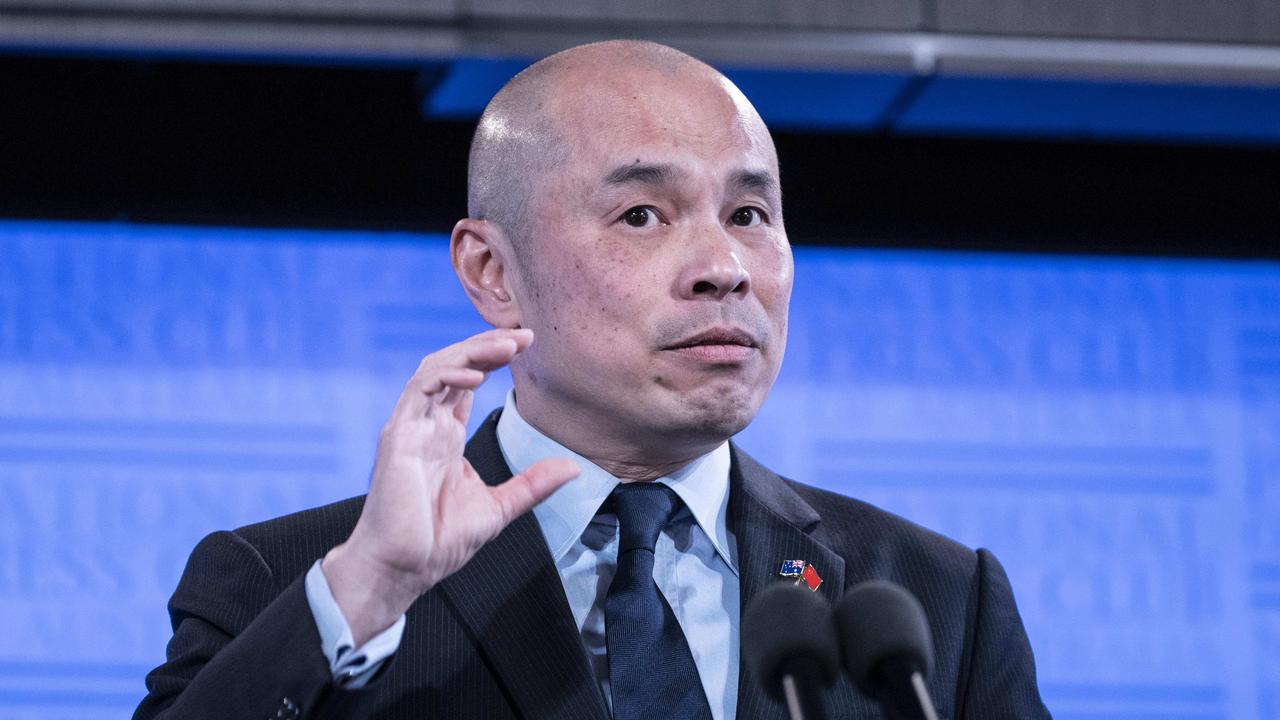
RELATED: China’s secret 'submarine cave’ revealed
And China’s deputy head of mission in Canberra, Wang Xining, also waded in with wolf-warrior rhetoric:
“I don’t see any reason for whining about your constitutional fragility and intellectual vulnerability,” he told the National Press Club on Wednesday. “We should not let a cold heart and a dark mind cast a shadow over our partnership.”
Mr Wang denied China’s spate of trade embargoes was an attempt at economic coercion.
He dismissed concerns about unduly influencing Australian politics.
Instead, Mr Wang likened “treacherous and disrespectful” Canberra’s desire to investigate the origins of the COVID-19 outbreak to stabbing Beijing in the back.
“It is approximately identical to Julius Caesar in his final day when he saw Brutus approaching him,” he said.
The historical Julius Caesar was a tyrant. Brutus was a senator attempting to save Rome’s representative system of government.
Foreign Minister Marise Payne responded by saying: “People use many metaphors. That’s not one that I would use.”
‘HIGH RISK’
Any sense of goodwill and diplomacy has been cast aside as Beijing knuckles down over its assertions.
The “relationship between China and the US is in free fall”, warned Senior Colonel Zhou Bo. “The risk of China-US military conflict is worryingly high.”
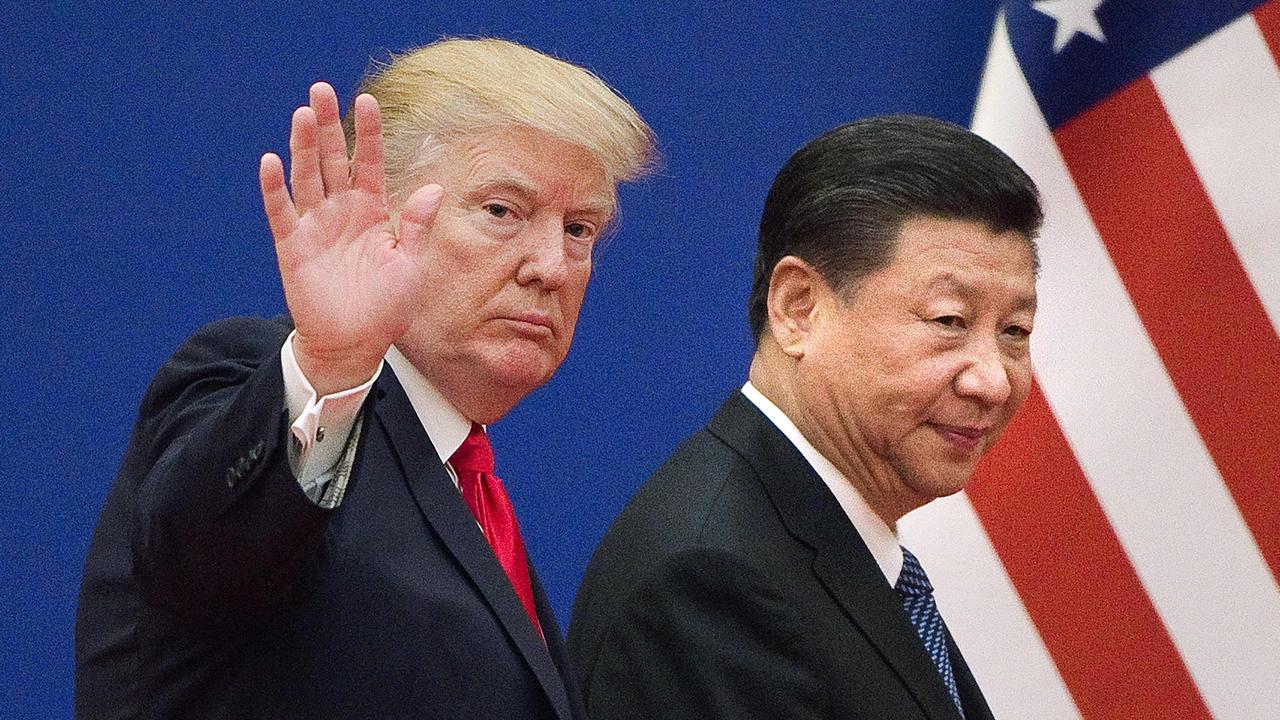
The international relations expert at the Academy of Military Science of the Chinese People’s Liberation Army published an editorial in the Financial Times.
Colonel Zhou said the US had abandoned its neutrality on the South China Sea as it is “worried about its global primacy”.
“President Donald Trump has also made confronting China his last-straw strategy to beat his opponent, Joe Biden. The risk of a mistake is, therefore, high,” he said.
CCP spokesman Colonel Zhou again rejected the notion that its fortresses in the Spratly region of the South China Sea were built on artificial islands. “These are natural Chinese territories that China has chosen to enlarge, and the fact they had names before land reclamation are proof they are not artificial.”
RELATED: Photos reveal new island ‘fortress’
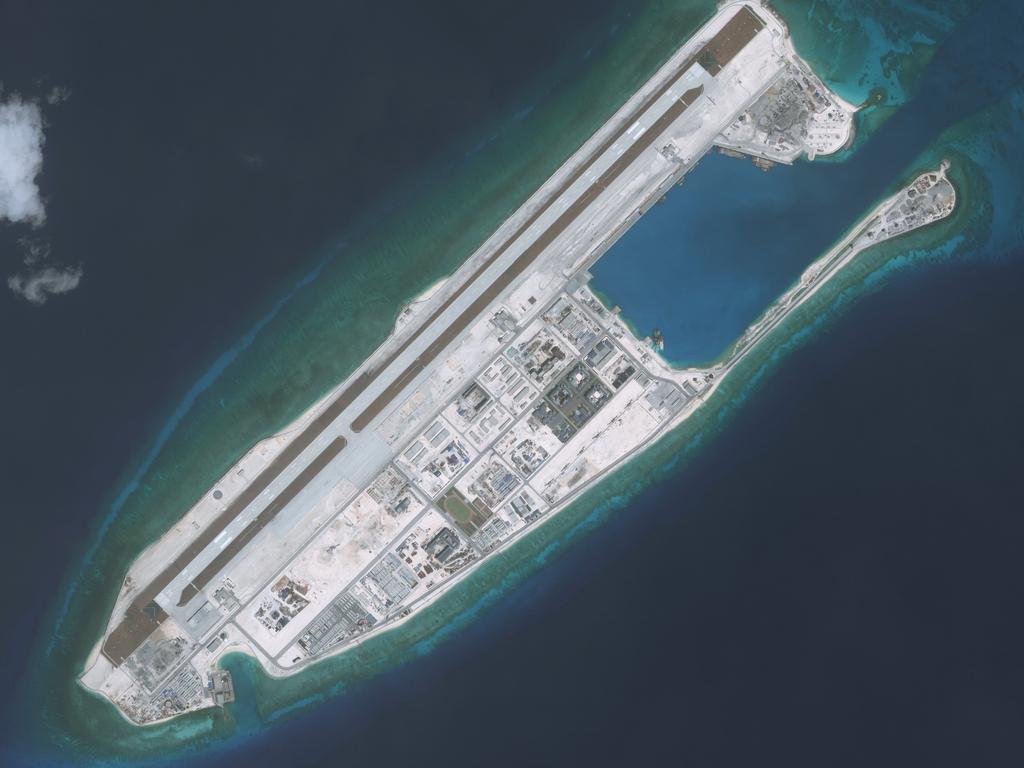
Names, however, are not criteria used to define sovereign territory under the UN Convention of the Sea. Beijing is a signatory to this treaty.
“Under Chinese law, a foreign military vessel’s entry into territorial seas needs government approval,” Colonel Zhou asserted.
“Washington cites Article 58 of the UN convention on the law of the sea to justify its right of freedom of navigation and overflight. But Beijing can quote the same article, which says: ‘States shall have due regard to the rights and duties of the coastal State’.”
But a 2016 ruling by an international tribunal found the waters – also claimed by much closer nations including Vietnam, the Philippines and Malaysia – are not Beijing’s territory to govern.
This has not stopped Beijing from threatening to enforce its arbitrary claim.
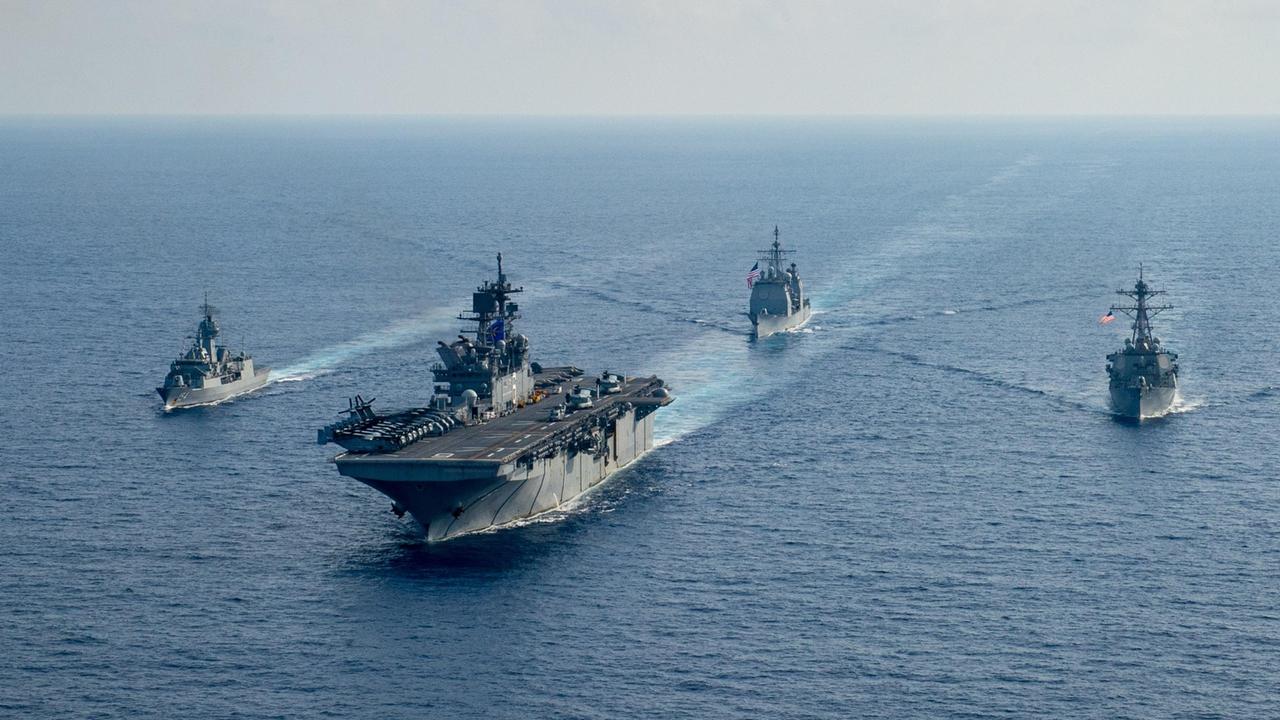
“If US ships and aircraft continue to maintain high-intensity surveillance of the South China Sea, there is always the potential for a confrontation,” Colonel Zhou said. “Eventually, it may be that the sheer size of China’s military prompts a US rethink.”
‘GRIM OUTLOOK’
Formal national security adviser and ASIO chief Major General Duncan Lewis this week spoke with the Australian Strategic Policy Institute (ASPI) about his fears for the future.
“It’s a pretty grim outlook at present, there’s not a lot to smile about,” he told National Security College head Professor Rory Metcalf. “(But) while the outlook is grim, I do not in any way regard it as being inevitable that we’re heading to some sort of major conflict.”
Major General Lewis said he was not convinced the world was reliving the 1930s rise of authoritarianism and fascism. Instead, he argues, it is entering a period of great uncertainty.
“I was asked recently, you know, does history repeat itself and we all know well, it doesn’t repeat. But it rhymes often. And I think there is some resonance in what we’re seeing at present.”
But there’s more.
Fires. The pandemic. A dramatic economic downturn.
A world of uncertainty has come home to roost.
“Uncertainty has been a mantra of the national security community as it looked at the global environment and the global risks that we’re presenting,” Major General Lewis said.
“What’s happened in the last sort of eight or nine months … is that a bunch of other social and environmental factors have come to bring uncertainty into the homes of almost every Australian.”
He said it was incorrect to focus only on China when it came to matters of undue political influence and espionage.
“It involves a range of countries. It is not just China. There are all sorts of people trying to gain access and interference in our community,” Major General Lewis said.
Meanwhile, the world – and Canberra – must explore ways and means of living with Beijing.
“China is a very complex phenomenon,” he said. “There is absolutely nothing wrong with an emerging power such as China pursuing its interests. All countries pursue their interests.”
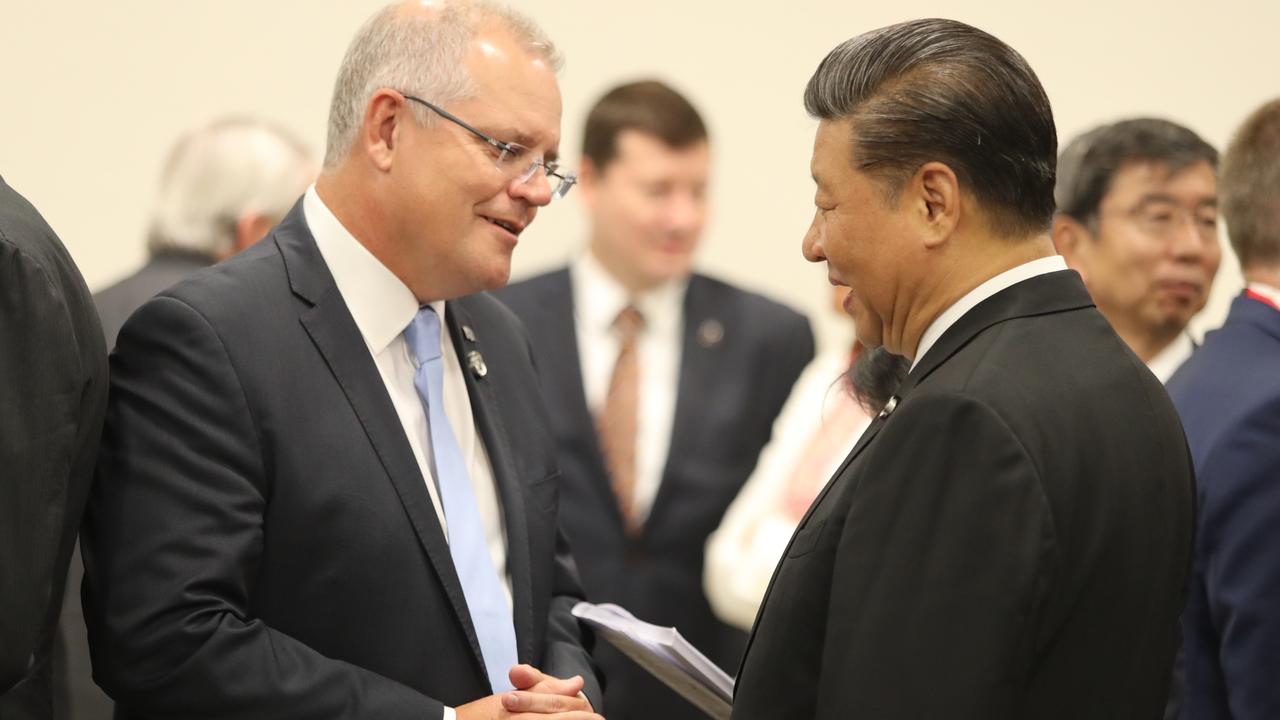
But China under Chairman Xi Jinping appears determined to follow its own agenda.
“The issue is how does the world adjust and accommodate,” Mayor General Lewis said. “And I don’t mean acquiesce, I mean, accommodate the reality of China.”
Maintaining standards, supporting international law and responding with a united global voice was at the heart of any answer, he said.
“That’s enormously important for Australia, you know that as a middle power, we are highly dependent on there being rules, that there are international laws and there are rules of behaviour.
“It’s absolutely in our interest to ensure those rules are followed. Where they’re not followed, we need to be able to call them out.”
Jamie Seidel is a freelance writer | @JamieSeidel




